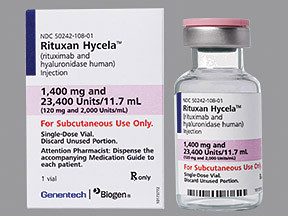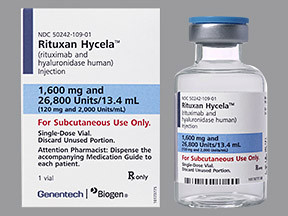RITUXIMAB - SUBCUTANEOUS INJECTION
PHONETIC PRONUNCIATION: (ri-TUX-i-mab)
COMMON BRAND NAME(S): Rituxan Hycela
GENERIC NAME(S): rituximab/hyaluronidase, human recombinant
Uses
USES: Rituximab is used alone or with other medications to treat certain types of cancer (such as non-Hodgkin's lymphoma, chronic lymphocytic leukemia). Rituximab belongs to a class of drugs known as monoclonal antibodies. It works by slowing or stopping the growth of cancer cells.
How to use RITUXIMAB - SUBCUTANEOUS INJECTION
HOW TO USE: Read the Medication Guide provided by your pharmacist before you start using rituximab and each time you get a refill. If you have any questions, ask your doctor or pharmacist. Your doctor will prescribe other medications (such as acetaminophen, an antihistamine, methylprednisolone) for you to take before each treatment to help reduce side effects, such as fever and chills. Carefully follow your doctor's instructions. This medication is given by injection under the skin of your abdomen by a health care professional. It is given as directed by your doctor, usually over 5 to 7 minutes. This form of rituximab is used only after receiving your first dose of rituximab by injection into a vein. The dosage and treatment schedule are based on your medical condition, other medications you may be taking, and response to treatment. Ask your doctor if you should take your regular medications (such as drugs for high blood pressure) before your treatment.
Side Effects
Precautions
Interactions
Overdose
Images
Reviews
Faq for RITUXIMAB - SUBCUTANEOUS INJECTION
Rituximab subcutaneous injection is primarily used to treat non-Hodgkin's lymphoma and chronic lymphocytic leukemia. It may also be prescribed for rheumatoid arthritis and granulomatosis with polyangiitis.
Rituximab works by targeting and binding to a protein called CD20, which is found on the surface of certain immune cells. By binding to CD20, Rituximab helps to effectively eliminate these abnormal immune cells, thereby reducing the progression of cancer or autoimmune diseases.
Rituximab subcutaneous injection is administered just underneath the skin, usually on the thigh or abdomen. It is typically given in multiple doses over a period of time, following a specific dosing schedule prescribed by a healthcare professional.
Common side effects of Rituximab subcutaneous injection may include infusion-related reactions (fever, chills, nausea), fatigue, headache, respiratory infections, rash, and musculoskeletal pain. It is important to discuss any side effects experienced with your healthcare provider.
The onset of action for Rituximab subcutaneous injection might vary depending on the specific condition being treated. In some cases, improvement may be noticed within a few weeks of starting the treatment, while for others, it may take several months to observe significant benefits.
Rituximab subcutaneous injection may increase the risk of serious infections, including reactivation of hepatitis B virus. It may also weaken the immune system, making individuals more susceptible to infections. Prior to starting treatment, it is important to inform your doctor about any existing medical conditions or ongoing medications.
The use of Rituximab subcutaneous injection during pregnancy or breastfeeding should be discussed with a healthcare professional. As with any medication, the potential risks and benefits must be carefully evaluated before making a decision.
If a dose is missed, it is important to contact your healthcare provider for guidance. They will advise on the best course of action, which may include rescheduling the missed dose or adjusting the treatment schedule.
Rituximab subcutaneous injection is approved for use in certain pediatric conditions, such as certain types of non-Hodgkin's lymphoma. However, the dosage and administration guidelines may differ for children compared to adults. It is essential to consult a pediatrician for appropriate use in children.
Warning
WARNING: Rituximab may rarely cause serious (sometimes fatal) side effects including severe breathing problems or heart problems (such as heart attack, irregular heartbeat). If these serious side effects occur, they usually happen after the first treatment (IV infusion) with rituximab. Get medical help right away if you have trouble breathing, itching, swelling (especially of the throat/lips), dizziness, fast/slow/irregular heartbeat, or chest pain. Rarely, people using this medication have had serious (sometimes fatal) skin reactions (such as Stevens-Johnson syndrome). Get medical help right away if you develop rash, blisters, peeling skin, or sores on your skin, lips, or in your mouth. This medication may increase your risk of getting a rare but very serious (possibly fatal) brain infection (progressive multifocal leukoencephalopathy-PML). Get medical help right away if you have any of these side effects: clumsiness, loss of coordination/balance, weakness, sudden change in your thinking (such as confusion, difficulty concentrating, memory loss), difficulty talking/walking, seizure, vision changes. Rituximab may cause serious (possibly fatal) liver disease in people who have current or past infection with hepatitis B. Before starting this medication, tell your doctor if you have ever had hepatitis B. Your doctor should do a blood test for hepatitis B before starting treatment. Tell your doctor right away if you have new or worsening symptoms of liver disease, such as nausea/vomiting that doesn't stop, loss of appetite, stomach/abdominal pain, dark urine, or yellowing eyes/skin.
Disclaimer
IMPORTANT: HOW TO USE THIS INFORMATION: This is a summary and does NOT have all possible information about this product. This information does not assure that this product is safe, effective, or appropriate for you. This information is not individual medical advice and does not substitute for the advice of your health care professional. Always ask your health care professional for complete information about this product and your specific health needs.


No Reviews Yet